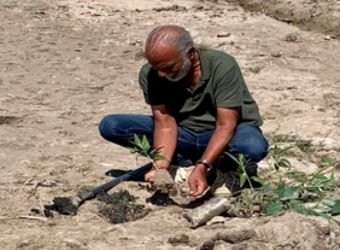“We need to educate all our farmers; small, medium, large, the landless peasants,
crop-sharers, of how to tackle the various difficulties we face: climatic conditions,
water-logging, how to plant and grow climate resilient crops, how to improve our
agricultural and irrigation practices.”
Pakistan’s economy can sustainably expand only if the nation implements productivity boosting reforms that allow a better distribution of resources and skills. In order to fight the current economic situation and food scarcity, the nation must focus on its strongest contributor: agriculture. A series of unfortunate events have brought forward a crisis for Pakistan: economic crisis, political crisis, food crisis and security crisis.
Pakistan’s economy is diverse, and has experienced significant growth over the years – but, the current situation is as worse as it could ever be. Even though agriculture is a major contributor to Pakistan’s economy, food scarcity is still affecting its people. The rate of inflation has been the highest since 1975, the prices of onions rose 245% in the past few months: from rs.55 to rs. 280. A bag of 5 kg flour which sold for rs.400 before, is now priced at rs.700. The country is currently facing a decline in its productivity. It is facing numerous difficulties ever since the pandemic hit. Besides political instability, it further depreciated due to the current floods destroying the homes and incomes of millions of people in the rural areas.
The country is in a state of emergency and we must work on recovering our agricultural lands. In conversation with the humble and known horticulturist, Tofiq Pasha Mooraj, we talked about what it took Pakistan to come to the verge of a crisis. “It is not easy to feed a country of 220 million people.” He said. “Even though we are an agrarian country, we are still faced with food insecurity and low productivity on the agricultural side, considering that so much of agriculture is a part of our GDP.”
So what went wrong? He further added, “To begin with, we are very backward in our agriculture and irrigation practices.” He explained, how we have ruined our lands and made them counter-productive, saline and waterlogged because of our obsolete ways of watering the fields, the way it was transported via canal system, which caused up to 30% loss of freshwater – on top of it we were doing flood irrigation, causing water loss with the lost water being absorbed into the ground causing the land to become water-logged.
“There is no monitoring of the moisture level or nutrient level in the soil. We’ve had a bumper crop of wheat in the drought year due to water-logging. Water-logging being one of causes of low-productivity in our agricultural lands, combined with climate change, has worsened the state of affairs.” The change in the season timings and the glaciers melting, have also altered the harvesting months of the crops. When the temperature is disturbed, the plants don’t get the full length of winter or summer, which causes the seed to dehydrate instead. So it’s a vicious cycle of backward technology, ways of irrigation, global warming, natural disasters and political instability triggering food scarcity and bringing Pakistan to a new low.


“So what is to be done? Whatever it is, it has to be done in fast track.” He continues. “We need to get rid of the standing water due to recent floods. Only once the water has been removed, the drying can take place – and make the land usable.”
We need to get that message across and for that to all kinds of farmers, and everyone who is a part of the rural system. We have to bring in technology and go towards modernization without harming the environment because only when the environment is protected, we will be able to deal with food insecurity. This assures the increased productivity and yield of our fields and brings us a step closer to be able to feed the entire country. It is imperative to keep the crop-sharers content with their livelihood and standard of life in their respective rural region so the need to migrate to urban centers for a better lifestyle does not arise and the onus is on the government, because only they have the resources to reach to the entire country. We as individuals can only influence a few thousand, but for a greater resolve, the government must create awareness programs and reforms for a healthier agricultural system.
As individuals, we must live in harmony with the environment. We need to change our lifestyles in order to preserve the nature, and try not to harm it more. A simple choice of dismissing plastic packaging can make a significant difference. Ensuring there is no waste of resources, is a step towards the betterment for all of us. We may not realize how big an issue of food scarcity is, but trust me, it is serious. It is threatening us and our future generations. Imagine having all the land to grow, but no food to eat. All the water in the world, but not drinkable. Read this again, let it sink in, and realize how grave this situation is.


